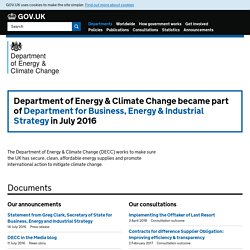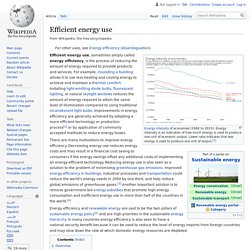

Economic & political. Energy Economics. Department of Energy & Climate Change. Skip to main content GOV.UK uses cookies to make the site simpler.

Find out more about cookies Is this page useful? Yes this page is useful No this page is not useful Is there anything wrong with this page? Thank you for your feedback Close Help us improve GOV.UK Don’t include personal or financial information like your National Insurance number or credit card details. To help us improve GOV.UK, we’d like to know more about your visit today. Don’t have an email address? Society & values. Efficient energy use. Energy efficiency Efficient energy use, sometimes simply called energy efficiency, is the goal to reduce the amount of energy required to provide products and services.

For example, insulating a home allows a building to use less heating and cooling energy to achieve and maintain a comfortable temperature. Installing LED lighting, fluorescent lighting, or natural skylight windows reduces the amount of energy required to attain the same level of illumination compared to using traditional incandescent light bulbs. Improvements in energy efficiency are generally achieved by adopting a more efficient technology or production process[1] or by application of commonly accepted methods to reduce energy losses. Renewable energy: Solar, wind, wave, tidal and hydropower. Legal. Energy, Environment and Resources. The Energy, Environment and Resources department, led by Bernice Lee , conducts high-level research on critical issues of energy security, environment and resource governance.

Latest: US Energy: the New Reality There is undoubtedly a US energy revolution under way – but where that revolution will lead is not yet clear. This paper explains trends in the North American energy landscape, and how they are likely to evolve. Read Combating Illegal Logging Duncan Brack considers the compatibility of efforts by consumer countries to reduce illegal logging with World Trade Organization rules. The Trouble with Biofuels Agricultural biofuel use increases the level and volatility of food prices, with detrimental impacts on the food security of low-income food-importing countries, says this new paper.
Resource Insecurity The outlook is one of supply disruptions, volatile prices, accelerated environmental degradation and rising political tensions over resource access, warns this new report. Contact. Science & technology. Smart Grid. “Smart grid” generally refers to a class of technology people are using to bring utility electricity delivery systems into the 21st century, using computer-based remote control and automation. These systems are made possible by two-way communication technology and computer processing that has been used for decades in other industries. They are beginning to be used on electricity networks, from the power plants and wind farms all the way to the consumers of electricity in homes and businesses.
They offer many benefits to utilities and consumers -- mostly seen in big improvements in energy efficiency on the electricity grid and in the energy users’ homes and offices. For a century, utility companies have had to send workers out to gather much of the data needed to provide electricity. The workers read meters, look for broken equipment and measure voltage, for example. The “grid” amounts to the networks that carry electricity from the plants where it is generated to consumers. Renewable Energy News. Environment. Ecodesign - Sustainable and responsible business - Enterprise and Industry. The Ecodesign Directive provides with consistent EU-wide rules for improving the environmental performance of energy related products (ERPs) through ecodesign - brochure [2 MB] .

It prevents disparate national legislations on the environmental performance of these products from becoming obstacles to the intra-EU trade. This should benefit both businesses and consumers, by enhancing product quality and environmental protection and by facilitating free movement of goods across the EU. Energy related products (the use of which has an impact on energy consumption) account for a large proportion of the energy consumption in the EU and include: